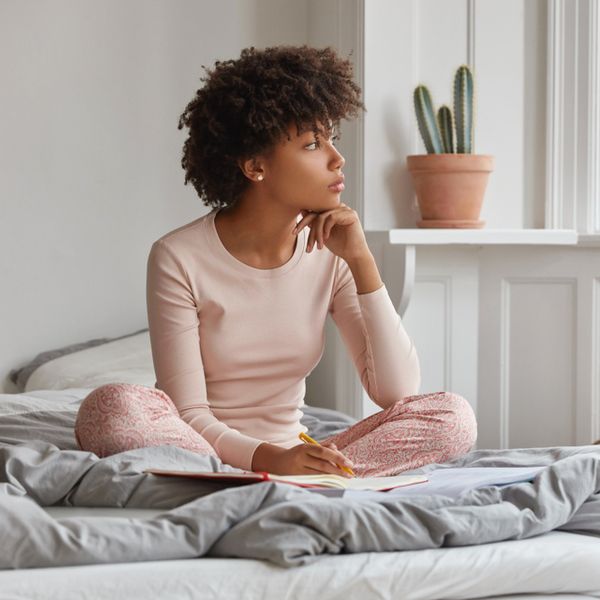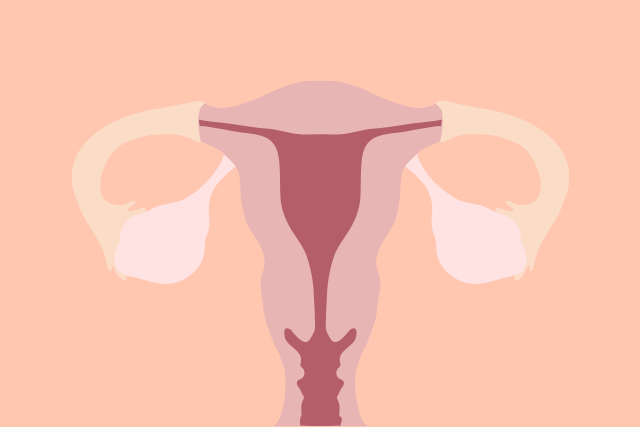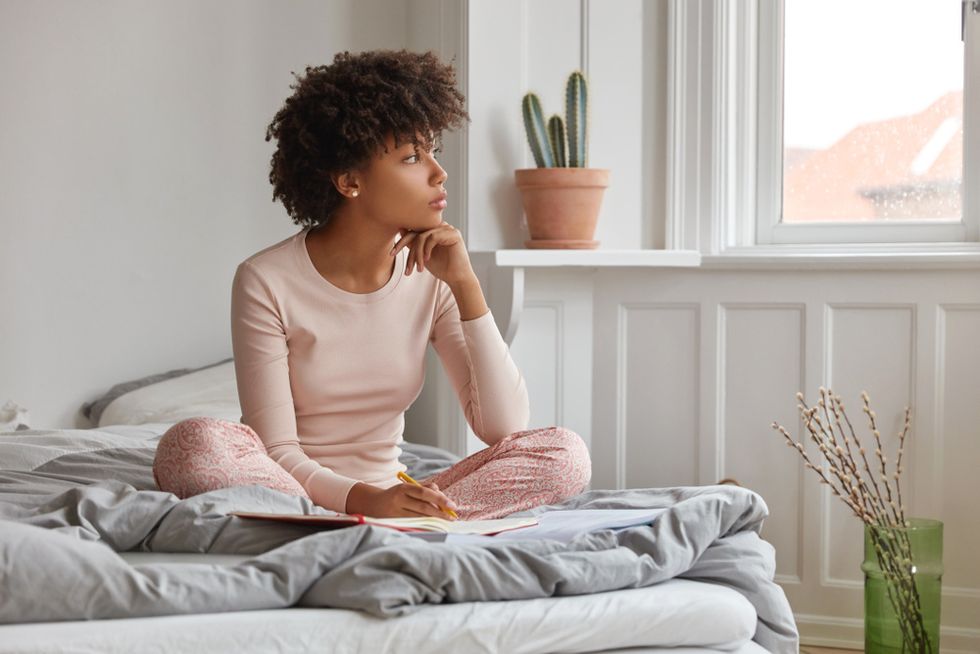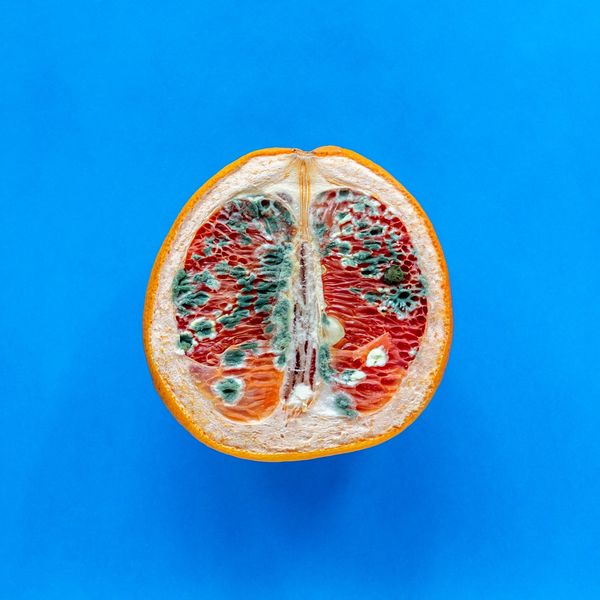
When I was 19 years old, my period didn't come for two months. Naturally, my first thought was, oh shit, I'm pregnant, because there was definitely a possibility. I had been with my then-boyfriend for years and we weren't using protection, so the idea of two lines showing up on a stick wasn't that far off. Buying a pregnancy test at a pharmacy can be such an awkward experience, so I pulled my hoodie over my face as if I was on the run from the law, grabbed a bunch of unnecessary items, and I bought the test. All of that, and it came back negative. My OBGYN warned me that it was possible that I could have gotten a false negative so I scheduled an appointment with her and I was hopeful that by the time I had gone, my period would have come. It didn't. Two months turned into three, so I walked into that office prepared for the worst. Because I knew I didn't want a child, I had been rehearsing how I would tell my doctor that I wasn't ready to be a mother. My relationship was beyond dysfunctional, I wasn't mentally prepared for motherhood, and as selfish as it sounds, I didn't want to be a teenage parent.
As my legs dangled on the examination table awaiting what I thought would be the worst conversation, she walked in, and immediately hugged me. It was as if she knew everything I was feeling and she leaned in and delicately asked me, "Do you desire pregnancy?" And I abruptly responded, "No ma'am." As gentle as she was, I still wondered how I found myself standing in front of the same doctor who made sure I was on birth control before I left for college, telling her I might be pregnant as I approached junior year.
The days that I waited to hear back from her felt like years, but one day while I was at work, she called. When I went back in for my follow-up, she wasn't smiling at all - she looked worried. The words that followed after changed my reproductive life forever: "You're not pregnant, you have PCOS." At that point, I felt like pregnancy would have been easier to swallow. Between my tears and overall confusion, what I made out from the conversation was my hormones were off-balance, and that because I had gained a significant amount of weight, there was a possibility that I could be infertile. Leaving the office, she also prescribed that I take a medication called Metformin to bring my period down and stay on birth control to regulate my cycle. Afterwards, I immediately went home, called my mom, and did tons of research on PCOS.
What You Need to Know About Polycystic Ovary Syndrome

According to Healthline.com, PCOS is defined as a condition that affects a woman's hormone levels. Women with PCOS produce higher-than-normal amounts of male hormones. This hormone imbalance causes them to skip menstrual periods and makes it harder for them to get pregnant. PCOS also causes hair growth on the face and body and baldness. And it can contribute to long-term health problems like diabetes and heart disease. Birth control pills and diabetes drugs can help fix the hormone imbalance and improve symptoms.
Who PCOS Affects
PCOS is a problem with hormones that affects women during their childbearing years (ages 15 to 44). Between 2.2 and 26.7 percent of women in this age group have PCOS and studies show that up to 70% of women who have PCOS haven't been diagnosed.
Symptoms of PCOS
- Irregular or skipped periods
- Cysts in the ovaries
- High levels of male hormones
- Infertility/difficulty getting pregnant (because of irregular ovulation or failure to ovulate because if your period isn't coming, you aren't ovulating)
- Excessive hair growth – usually on the face, chest, back or butt.
- Weight gain
- Patches of dark skin
- Thinning hair and hair loss from the head
- Oily skin or acne
How PCOS Affects Black women
- Increased rates of hirsutism (excess hair growth in typical male patterns, but on a female)
- Higher risk of cardiovascular disease or metabolic syndrome
- Lower likelihood of getting pregnant (Black women do not have as much success with in vitro fertilization as white women, and they're also more likely to be obese—a risk factor for infertility)

Shutterstock
All of the information I found on Beyonce's internet, and I still felt lost because, outside of the irregular period, I had none of the symptoms that I saw online. I'd gone from mentally preparing to have an abortion, to searching for support groups for a hormonal disorder that could prevent me from having children. With a combination of prayer and self-reflection, I decided I'd do whatever it took to take my body back. As kind as my doctor had been, she wasn't helpful outside of the scope of Western Medicine and I needed more than pills, I needed real healing.
Over the course of three years, I did these things to reverse my PCOS symptoms:
- I worked out two to five days a week
- I went all organic (I started with little things, like buying the foods I consumed the most in the organic variety)
- I stopped drinking sodas/juice and eliminated high carb fruits/vegetables from my diet (I now only drink water, coffee, and green juice with no fruits added daily)
- I focused on losing stomach fat because excess weight around my midsection means added pressure on my ovaries
- I reminded myself that on days when I didn't want to work out, I was doing this for the children I wanted to give life to someday (I know it sounds like a lot but the thought of infertility is scary so I practiced affirmations daily)
- I got off Metformin and relied on my body to do the work
Months before my 23rd birthday, I made a follow-up appointment with my doctor. She was thrilled to tell me that my androgen levels (testosterone levels) had gone down and that I was making great progress. I walked out of that office feeling like I was finally on the path to fertility again, but I was still on the pill. What most doctors don't tell you about your period on birth control, is that it's not a real period. Because birth control alters the levels and hormones in your body, menstruation is triggered by a drop in the hormones estrogen and progesterone, both of which are artificially produced by the pill. This means that menstruating on the pill isn't a real period; it's "withdrawal bleeding" produced by a lack of artificial hormones aka, a "fake" period. So I couldn't be happy with those levels dropping if I was still taking birth control pills.
Once I was single I became celibate, so I didn't need the pill anymore, but I stayed on out of fear. Days before I finished my last pack, I decided to trust myself, pray even harder, and thirty days after I got off the pill, my period came on time and it's been regular ever since. My cycle has changed so much since being off the pill for the better, and I can feel so much now that I didn't before. Ovulation is something I'm excited to experience. I no longer have menstrual cramps because I feed my body what it needs, and I stay active. This journey hasn't been easy but I made a decision to undo the damage, and research (on everything from herbs to fight PCOS, plant-based feminine products, what your menstrual blood color means, and how to keep your hormone levels even through your diet.)
That doctor's appointment was eight years ago, and I'm now 60 lbs down. I have a new fertility doctor who, after a series of tests, officially confirmed that I was misdiagnosed. And I'm exploring such a beautiful relationship with my body and womb wellness overall.
Want more stories like this? Sign up for our newsletter here to receive our latest articles and news straight to your inbox.
Featured image by Shutterstock
This Is How To Keep 'Holiday Season Stress' From Infecting Your Relationship
Hmph. Maybe it’s just me, but it seems like there is something really weird happening in the fall season air (because winter doesn’t officially begin until December 21) that cuddle season is in full swing while break-up season is as well. In fact, did you know that break-ups are so popular during the holiday season that December 11 is deemed Break-Up Day?
The reasons why relationships shift around this time vary; however, I did both roll my eyes and chuckle when I read that a very popular one is because it’s an easy way to get out of getting one’s significant other a Christmas present. SMDH.
Anyway, I personally think that the less shallow folks out here may contemplate calling things “quits” or they at least distance themselves a bit from their partner (and what I’m referring to is serious relationships) due to all of the stress and strain that oftentimes comes with the holidays whether it be financial, familial, due to their tight schedules or something else.
Listen, I would hate for you and your man to miss the fun and happiness of experiencing this time of year, all because you are so overwhelmed or irritated that you can’t really enjoy it. That’s why I have a few practical tips for how to avoid allowing the typical holiday season stress from INFECTING your relationship.
Manage Your Expectations
 Giphy
GiphyUnmanaged expectations. If there is a main reason why the holiday season tends to be so stress-filled for so many people, I’d bet good money that this is the cause. And when you’re in a long-term relationship, expectations can manifest themselves in all sorts of cryptic and/or unexpected ways. You might have relatives who assume that you are going to be with them for Thanksgiving or Christmas when you have other plans in mind. You might be thinking that you are going to spend one amount for presents while your man is thinking something totally different. When it comes to scheduling, your signals may be crossed.
And you know what? To all of these scenarios, this is where clear and consistent communication come in. Don’t assume anything. Don’t dictate anything either. From now until New Year’s, mutually decide to check in once a week, just to make sure that you are both on the same page as it relates to the holidays and what you both are thinking will come along with it. The less blindsided you both feel, the less stressed out you will be. Trust me on this.
Set (and Keep) a Budget
 Giphy
GiphyOkay, so I read that last year, 36 percent of Americans incurred some type of holiday-related debt. Hmph. Last year, there was still some sense of normalcy in this country, chile, so I can only imagine what finances are gonna look like over the next several weeks. That said, since I don’t know a lot of people who don’t find being broke stressful, make sure that you and your bae set a budget and then stick to it this year — no ifs, ands or buts.
Because really, y’all — it doesn’t make sense to deplete savings and/or max out credit cards for a few days of giggles only to be damn near losing your mind because you don’t know how to make ends meet come Dr. Martin Luther King, Jr. Day.
And by the way, this tip doesn’t just speak to things like food and gifts; I also mean travel. If it doesn’t make a ton of sense (or cents) to be all over the place this year — DON’T BE.
Keep Matthew 5:37 at the Forefront
 Giphy
GiphyIf off the top of your head, you don’t know what Matthew 5:37 says, no worries, here ya go: “But let your ‘Yes’ be ‘Yes,’ and your ‘No,’ ‘No.’ For whatever is more than these is from the evil one.” That verse right there? Oh, it’s a boundaries lifesaver! I say that because do you see “maybe” or “I’ll think about it” in there? Nope. LOL. It says that you should tell people “yes” or “no” and leave it at that — and that complements Anne Lamott’s quote, “’No’ is a complete sentence” impeccably well. Yeah, you’ve got to remember that anything beyond a yes or no to a request is privileged information; you don’t owe anyone details or an explanation.
Besides, if you are really honest with yourself, when someone asks you something and you give a “Umm, let me think about it” kind of reply, more times than not, you already know what your answer is going to be — so why not let you both off of the hook? Give your response. Commit to that. And let everyone (including yourself) get on with their lives and schedules.
I promise you that when it comes to those holiday parties, you are pissing more folks off by not RSVP’ing or doing so and not showing up than just saying, “Thank you but not this year” off the rip.
Remember That Your Personal Space Is Privilege Not a Right
 Giphy
GiphyA friend of mine recently bought a new house and invited me over to come see it. He’s a single man with no children, so as I was taking in all of the space that he had, especially as I walked through his finished basement, I joked about relatives coming to live with him. “Hell no” and “absolutely not” were pretty much his immediate responses as he went on to say that some folks even had the nerve to be offended when he told them that he had no intentions on taking DNA in.
Ain’t it wild how people think that your stuff is their right? And yes, that brings me to my next point. Your home is your sanctuary space. If you want to host folks this year — cool. If not, ALSO COOL. Please don’t let folks (family included) guilt you into how they want you to act or even into what they would do if the shoe was on the other foot. You are not them — and as one of my favorite quotes states, “If two people were exactly alike, one of them would be unnecessary.” (A man by the name Larry Dixon said that.)
Hell, my friends? They know that I am good for sending them random things that they need or even want all throughout the year. Coming over to hang out at my pace, though. Uh-uh. Chalk it up to being a card-carrying member of the ambivert club yet I like keeping my living space personal — and I sleep like a baby, each and every night, for feeling that way.
Always remember that your space, your time, your resources, your energy and shoot, yourself period (including your relationship), are all things that are your own. You get to choose how, when and why you want to share them. The holiday season is certainly no exception.
Cultivate Some “You Two Only” Traditions
 Giphy
GiphyIt’s not uncommon for some couples to hit me up after the holiday season to “detox.” Sometimes it’s due to the financial drama (and sometimes trauma) that they experienced. Sometimes it’s because they allowed their relatives (especially in-laws) to get more into their personal business than they should’ve. More than anything, though, it tends to be because they didn’t get enough quality time together and so ended up feeling “disconnected.”
Please don’t let that happen. Listen, I’m not even a holidays kind of woman and yet, I will absolutely sit myself down with some hot chocolate and chocolate chip cookies to enjoy a Hallmark holiday film or two. Aside from the fact that most of them are lighthearted and sweet, I also like that they usually focus on couples loving on each other amidst all of the holiday beauty and ambiance — which is something that all couples should set aside some time to do.
Maybe it’s a vacation. Maybe it’s a staycation. Or maybe it’s my personal favorite, A SEXCATION. Whether it’s for a few days, the weekend or even overnight — don’t you let the holidays go by without setting aside time for you and your man to celebrate one another. Don’t you dare (check out “Are You Ready To Have Some Very Merry 'Christmas Sex'?”).
GET. SOME. REST.
 Giphy
GiphyI once read that 8 out of 10 people get stressed out over the holidays and 3 out of 10 lose sleep during to it — and when you’re stress-filled and sleep-deprived, that can absolutely lead to hypersensitivity, making mountains out of molehills and even not being in the mood for sex.
Your relationship can’t afford to go through any of this, so definitely make sure to prioritize rest. I don’t care how unrealistic it might seem during this time, sleep should never be seen as a luxury; it will always and forever be a great necessity.
That said, try to get no less than six hours of shut-eye in (check out “6 Fascinating Ways Sex And Sleep Definitely Go Hand In Hand”) and even ask your bae to take a nap with you sometimes (check out “Wanna Have Some Next-Level Sex? Take A Nap, Sis.”). Not only will sleep help to restore your mind, body and spirit but, when it’s with your partner, it’s an act of intimacy that can make you both feel super connected, even in the midst of what might feel like chaos.
___
Holiday season stress is real. Still, never give it the permission or power to throw your relationship off. Put you and your man first and let the holidays be what they are gonna be, chile.
Let’s make things inbox official! Sign up for the xoNecole newsletter for love, wellness, career, and exclusive content delivered straight to your inbox.
Featured image by Shutterstock
Dreaming Of A White Christmas? These 7 Winter Wonderland Destinations Are Perfect For The Holidays
While most people opt for a tropical vacation during the winter months, there are still many people who want to fulfill their winter wonderland fantasies, which are more than likely centered on watching snow by the fireplace while sipping some hot cocoa.
With Thanksgiving vastly approaching and Christmas a little under a month away, there is still time to ditch the traditional Christmas home to visit family or friends.
Whether you’re looking to put a new stamp on your passport and keep things domestic with a destination in the States, xoNecole has you covered with a few hotspots for those itching to go somewhere cold (but with cozy vibes) this holiday season.
Aspen, Colorado
Our Christmas queen, Mariah Carey, has been taking an annual trip to this snowy destination since 1997, just three years after dropping the track that would make her the unofficial (but official to us) ambassador of the winter holiday.
Aside from being a key vacation spot for one of the culture’s greatest musicians, Aspen also offers travelers access to world-class skiing and snowboarding and four distinct mountains that provide the perfect backdrop for a winter vacation.
Whistler, British Columbia, Canada
Home to the largest ski resort in North America, Whistler Blackcomb, this destination is located in the Coast Mountain Range and is about 75 miles north of Vancouver.
From luxury spas like Scandinave Spa Whistler to Olympic Park, this is another top winter vacation spot that offers a unique experience for people who love snow and the thrill of a good adventure.
Western Massachusetts
Dubbed the place for a magical holiday escape, Springfield, Massachusetts, blends the warmth of small-town charm with unforgettable experiences like Grinchmas at Springfield Museums, Winterlights at Naumkeag in Stockbridge, Historic Deerfield’s Winter Frolic, and many others.
This destination offers something for all ages, and it’s close to home, making it all the more reason to place on your radar for a winter getaway.
Rovaniemi, Finland
If you want to really get into the Christmas spirit, this just may be the place for you. As the official home to Saint Nick himself, Rovaniemi, Finland offers reindeer sleigh rides, the opportunity to stay in a glass igloo, as well as an opportunity to experience the Santa Claus Village.
Lake Tahoe, California/Nevada
Who says that visits to the lake house are only reserved for summer vacation? A winter trip to Lake Tahoe is equipped with stunning lake views and top-notch ski resorts, including Heavenly and Northstar.
Chamonix, France
Sitting at the base of Mont Blanc, Chamonix, France, is known for its skiing and mountaineering. This destination is home to the Aiguille du Midi cable car, the charming Alpine village, and is also close to various other European ski destinations.
Northeastern Pennsylvania
This area of the U.S. state is home to the Poconos Mountains, whose renowned ski resorts include Camelback Mountain, Blue Mountain, and Jack Frost Big Boulder. Whether you’re a ski expert, a beginner, or just there for the vibes, this destination makes for a winter vacation that balances fun adventures and cozy getaways. Additionally, Pennsylvania is home to the Christmas Tree Capital of the world.
Feature image by Shutterstock
Originally published on November 23, 2024









